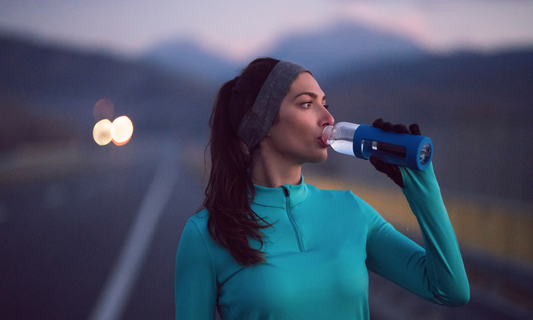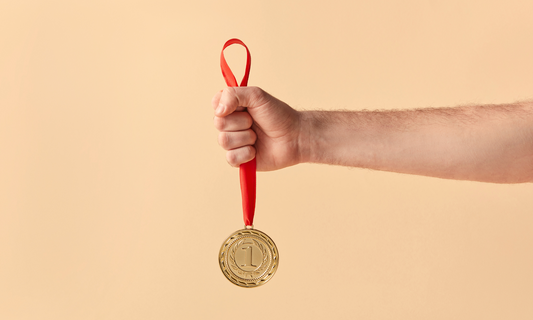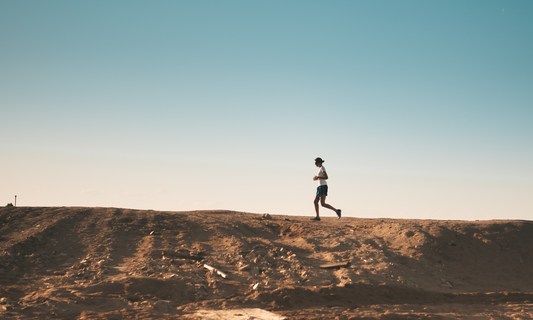What are the hydration secrets of top athletes?

Hydration is a key element in optimizing performance and recovery for elite athletes. Athletes have specific water needs that require a more precise and personalized approach. In this article, we'll explore the hydration secrets of elite athletes and the strategies they use to maintain optimal fluid balance and avoid dehydration.
Understanding the specific needs of athletes
The human body is composed of 60% water, which is involved in many physiological functions. Water helps transport nutrients, regulate body temperature, and maintain muscle and joint health .

High-level athletes have significant water losses, particularly more than average, due to the intensity of the effort and the duration of their training sessions and competitions. Perspiration is the main water loss , it is the mechanism by which the body regulates its temperature but it also causes a significant loss of electrolytes such as sodium, potassium and magnesium . This is why it is important to compensate for these losses to avoid the risk of dehydration .

In general, an adult needs to drink between 1.6L and 2L of water per day depending on gender and profile, but for an athlete, these needs can be much higher. During intense or prolonged exercise, water loss can reach several liters per hour , especially in very hot weather. In addition, water loss varies depending on the sport; for example, a marathon runner or a cyclist competing in the Tour de France will need to drink more than a footballer.
Additionally, some studies show that water loss of just 2% of body weight can lead to a significant decrease in physical and cognitive performance. More severe dehydration can then cause muscle cramps, fatigue, dizziness, and in some cases, heat stroke.
Hydration strategies
Hydration before exercise
Before exercising, athletes are advised to stay well hydrated. Arriving dehydrated for training or a competition can be detrimental to performance! We recommend drinking between 5 and 7 ml of water per kilogram of body weight per hour , 2 to 4 hours before the activity, to ensure an adequate supply of fluids, or between 350 and 490 ml per hour for a person weighing 70 kg . This intake allows athletes to ensure good hydration before their activity without overloading the digestive system with liquid, which could cause discomfort during exercise.
Hydration during exercise

During exercise, maintaining hydration is essential. It is recommended to drink regularly , approximately every 10 to 15 minutes , in small quantities to avoid digestive problems. In total, you should consume between 500 and 800 ml of water per hour of exercise depending on weather conditions. For efforts lasting longer than one hour, it is often recommended to consume drinks containing carbohydrates and electrolytes (such as sodium and potassium) in order to maintain energy balance and slow the onset of fatigue.
Hydration after exercise
After exercise, hydration is also essential for recovery . Drinking water helps restore the body's water balance and eliminate toxins accumulated during exercise. It is recommended to drink approximately 1.5 times the amount of body weight lost during exercise , this will help compensate for water losses. For example, for a loss of 2 kg during exercise, it is recommended to consume 2 x 1.5 L or 3 liters of water post-exercise.
Recovery drinks, which contain both carbohydrates to replenish glycogen stores and protein to promote muscle repair, are also recommended. They not only help rehydrate but also accelerate muscle recovery, which is essential for athletes who train daily. Gradual fluid intake is recommended to promote fluid retention and reduce the risk of overhydration. Mixes containing carbohydrates and sodium are essential to promote good muscle recovery and reduce the occurrence of cramps and muscle soreness .
The different types of sports drinks
Isotonic drinks
Isotonic drinks have a concentration of electrolytes and carbohydrates similar to that of blood plasma, which allows for rapid absorption by the body.
Hypotonic drinks
Hypotonic drinks contain a lower concentration of electrolytes and carbohydrates than blood plasma, allowing them to be absorbed more efficiently by the body.
Hypertonic drinks
Hypertonic drinks have a higher concentration of carbohydrates and electrolytes than blood plasma, making them slower to absorb by the body. Avoid consuming them because they can cause digestive problems and promote dehydration .
Some factors to consider
To adopt this approach to hydration, it is crucial to adapt the athlete's hydration according to their activity , their intensity and the environment in which they operate.
In hot weather, when temperatures exceed 25°C, sweating increases, which increases the body's need for water . It is therefore necessary to hydrate regularly and in greater quantities .

The intensity of the exercise is another factor to consider. The more intense the exercise, the greater the hydration needs . Endurance sports require special attention because water and electrolyte losses can be significant.
Diet is also very important to meet your water needs. Hydration does not only come from water but also from food. Certain foods are therefore particularly interesting to help maintain good hydration due to their rich water composition. Watermelons , melons, vegetables such as cucumbers, zucchini, eggplant are rich in water, vitamins and minerals and will help replenish electrolytes lost during exercise, particularly through sweating.
Hydration is a crucial element for elite athletes, directly influencing their performance and recovery. By understanding and applying the principles of optimal hydration before, during, and after exercise, athletes can maintain appropriate fluid balance , prevent dehydration, and optimize their performance. Oral rehydration solutions , sports drinks , and a water-rich diet are essential tools to achieve these goals. Athletes must therefore adapt their hydration strategies according to their profiles and environmental conditions to ensure optimal performance and rapid recovery.











